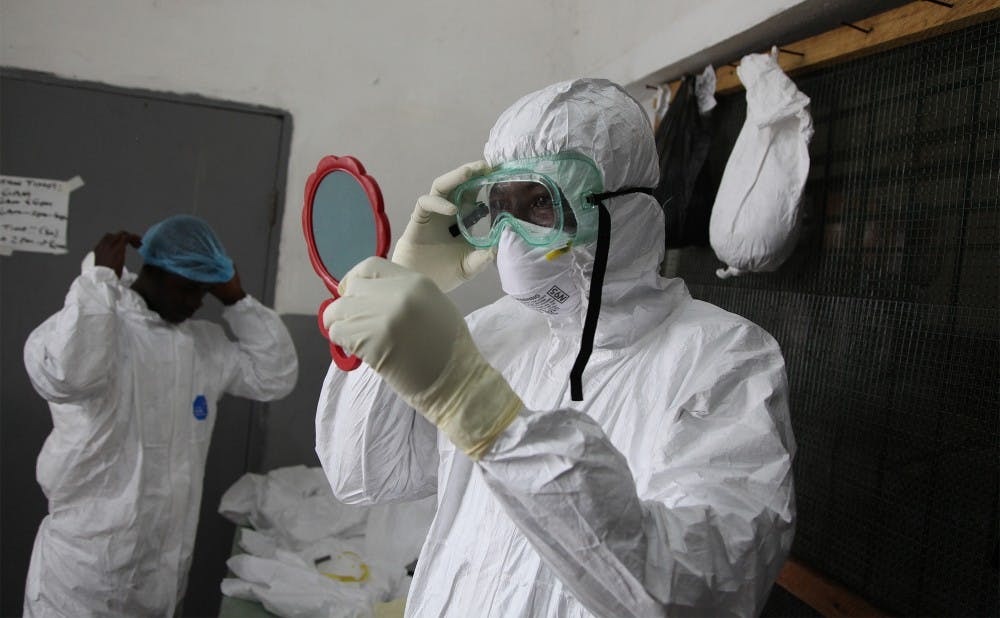A patient being treated for possible symptoms of Ebola at Duke University Hospital may be removed from isolation after further tests are conducted Wednesday.
The patient, who entered the United States from Liberia last week and then traveled to North Carolina by bus, was transported to Durham and put in isolation at Duke Hospital after reporting a fever on Sunday. Preliminary tests conducted on the patient by the N.C. Department of Health and Human Services when he was admitted indicated that he did not have the Ebola virus. Until further tests are conducted, the patient will continue to be held in isolation. During a conference call Monday, state officials said that the patient had shown no further symptoms of Ebola beyond fever.
“The patient is here and in stable condition,” said Dr. Lisa Pickett, chief medical officer of Duke Hospital.
Although state officials have said that the patient does not have any symptoms beyond a fever, Pickett refused to comment further on the patient’s condition, citing patient privacy requirements.
Pickett said that the same blood test that was carried out on Sunday will be repeated on Wednesday to make a final determination as to whether the patient has Ebola. She said that if the patient does have Ebola, a second test after a three-day interval will be much more likely to come back positive than the preliminary test.
“The reason that we repeat the test in 72 hours is because if they’re going to turn positive, then by that time they should have a high enough viral load that it should turn the test positive,” Pickett explained.
If the test comes back negative, Pickett said that the patient will be removed from isolation and treated like any other patient at the hospital.
“We would take care of the patient in whatever way was appropriate for his clinical condition,” she said.
Pickett emphasized, however, that until the next round of testing is completed, Duke Hospital is continuing to treat the patient as if he has Ebola. All staff and equipment involved in the patient’s care are not involved in the treatment of any other patient in the hospital, she said.
“The rest of the patients throughout the health system are completely safe from this,” Pickett said. “These providers are not providing care to any other patients.”
State officials have also said that the patient’s movements and contacts will continue to be traced until the next round of tests come back negative.
The patient, who has been identified only as a male, arrived at Newark Liberty International Airport from Liberia Friday. He displayed no symptoms of the virus when he took a bus to Durham, but developed a fever Sunday morning after traveling to nearby Person County. A special EMS unit transported him back to Durham, where he was admitted to Duke Hospital.
Pickett said that students should have no reason to worry about any potential danger.
“I feel 100 percent comfortable about that,” she said.
Dr. Monte Brown, vice president for administration for DUHS, presented information about the situation to the City Council Monday evening.
Brown noted that Duke had had a bit of "luck" in terms of its ability to isolate and accommodate the patient, saying that the transfer from the old hospital buildings to the new Duke Medicine Pavilion meant an empty ICU was available and could be converted to an appropriate space for the patient.
"Everything went right in this case that we ask for in this country," Brown said, noting that the patient had self-identified as being at risk for the virus and reported himself to the Center for Disease Control, rather than going to an emergency room or clinic.
Durham Mayor Bill Bell expressed appreciation for Duke's handling of the case.
"We all know that we're fortunate to live in a region where we have great health institutions, not the least of which is Duke University," Bell said at the meeting.
Though the Duke community should not feel as if they have anything to worry about, being conscious of one's health as flu season begins is important, Pickett said. The best thing that students and the general public can do to reduce their risk of becoming ill is to get their yearly flu shot, she noted, adding that doing this could also reduce the risk of false Ebola scares as cold and flu season picks up.
“As we get into cold and flu season there will be more people with fevers, and in particular some people in the University who may have traveled,” Pickett said. “The best outcome for students throughout the University and faculty is to get their flu shots to prevent them from getting the flu and being worried about it.”
Get The Chronicle straight to your inbox
Signup for our weekly newsletter. Cancel at any time.

